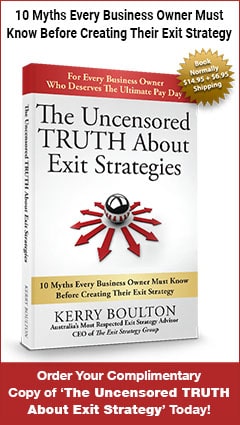Keys That Determine The Value Of Your Business
Obviously, profit is number one. You need to show you have some profit in the business. There could be other redeeming factors, but, in general, one of the most important aspects is your financial results.
Another factor is looking at how much industry growth there is. Can you show some blue sky? If the industry does have strong growth potential, how attractive is that to somebody else?
Next would be looking at how reliant the business is on a potential supplier or a key staff member. If you have a high exposure to one supplier, it will make you quite vulnerable, unless you have someone who is really keen to have a relationship with that supplier. If that’s the case, then that’s good leverage.
If you’re reliant on a key person, maybe it’s you in your business or another staff member or even a customer, you must to find a way to spread out the risk. Again, this could be a possible reason for someone wanting to buy your business, but it really doesn’t make good sense strategically.
Just remember, if you can’t take a holiday and go away for three or four weeks at least and have the business run successfully without you, then that’s going to detract from the business value in the future. So, unless you’ve got a business that’s designed as a job for you, it’s about getting you out of it and making sure the business can run without you.
You also need to take a look at your cash and see how you are managing. A buyer who’s interested in your business will often have to write two cheque, metaphorically speaking — one to buy the business and the second for working capital. You need to look at how much cash is actually needed in the business and see if you can minimize what’s necessary.
Another key factor is recurring revenue, which is about developing a means within your business to create automatic, ongoing revenue so you don’t have to keep making sales — maybe like a subscription.
A good example is an online shaving club, where you pay a small amount and every month you get new razor blades delivered to you. The base subscription is recurring revenue for the company. Magazine subscriptions and mobile phone plans are other examples of recurring revenue.
Next on the list is to think about your value proposition — what makes your business unique. Warren Buffet is famous for saying he wants to invest in companies that “have a moat” around their business. The deeper and wider the moat, so to speak, the harder it is for competitors to get in there and compete.
There is a fabulous example in the winery industry of an Australian company that took their wine to the United States. They looked at the alternatives, the choices available, and asked, “How can we capture market share and not be really pretentious about the wine?”
So, this is how Yellowtail wine was launched. It was a fine, easy-to-drink wine that you could enjoy every day — it didn’t have to be for special occasions. It was also absolutely simple because you could only get two varieties, one red and one white.
The kangaroo label was simple and colourful with no technical jargon about the nose or any of that sort of thing. It was sweet and fruity, which appealed to a broad market, and the price was keen. It was in all the supermarkets.
Their arrival in the U.S. market made a huge impact. Yellowtail did a great job of figuring out how they could differentiate, what gave them a big competitive advantage.
One of the final value factors to pay attention to is customer satisfaction. Find out from your clients how satisfied they are and be able to justify it. That’s a really good way to add credibility and value to your business because if your customers are really happy and keep coming back, that’s worth a lot and it’s something worth buying.
If you pay attention to these factors for determining the value of your business, you will maximise your opportunities for exiting more strategically and with better financial results.



Recent Comments